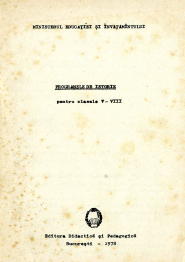
PROGRAMELE DE ISTORIE PENTRU CLASELE V-VIII
Editor: MINISTERUL EDUCAŢIEI ŞI INVAŢIMINTULUI Publisher: Editura Didactică şi Pedagogică Bucureşti - 1978 published as: Comandă fermă nr 26o IiP."Buletinul Oficial" Secţia XIX Cda. 14949/1978
More...We kindly inform you that, as long as the subject affiliation of our 300.000+ articles is in progress, you might get unsufficient or no results on your third level or second level search. In this case, please broaden your search criteria.

Editor: MINISTERUL EDUCAŢIEI ŞI INVAŢIMINTULUI Publisher: Editura Didactică şi Pedagogică Bucureşti - 1978 published as: Comandă fermă nr 26o IiP."Buletinul Oficial" Secţia XIX Cda. 14949/1978
More...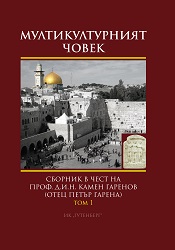
The town Razgrad from today was established in the XV century on a early Thracian, Roman and Bulgarian settlement. During the Renaissance and the period from the middle of the XIX century Bulgarians in Razgrad created their own municipality and joined the struggle for church independence and establishing a new school. In 1860 was built the current church "St.Nikolai" and the authority of the Ecumenical Patriarchate was rejected. For the educational and spiritual development of the city worked many of the citizens from whom more notable were S. Petrov, D. Hranov, A. Tsanov, N. Georgieva and others.
More...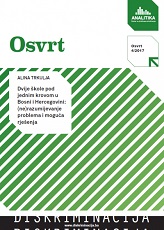
The focus of the work are the so-called "Two schools under one roof", currently 34 such in two cantons of the Federation of Bosnia and Herzegovina (hereinafter FBiH), Herzegovina-Neretva (HNK) and Central Bosnia (SBK), according to which students attend classes in two schools within one school building, separated by ethno-national affiliation, often with a ban on "mixing". Here, segregation and even discrimination in schools are more clearly seen, but in areas of BiH with a dominant ethnic majority, although it should be noted that the latter are not immune to them either. Because, as simplistic as it may sound, Bosnia and Herzegovina essentially has three types of schools3 and three school systems or “three schools under one roof”. // The aim of this analysis is to map current practices in education in BiH from the perspective of language and identity, as well as to identify dominant concepts and models for solving the problem of divided education operated in political and expert platforms and initiatives in this area, and critically evaluate them. in accordance with the principles, values and goals of education established by the international human rights framework and the state legal framework. About this practice, with emphasis on the attitudes of teachers, parents and students, several major studies have been done so far, the conclusions of which are the starting point and basis for the analysis of proposed models of education.5 Relevant international standards and laws were used as primary sources. and strategic documents in BiH. From secondary sources, books, academic and media articles and reports, as well as media appearances of relevant actors and experts in the field of education were consulted. Through interviews with experts and decision-makers at various levels, primarily representatives of the OSCE and relevant ministries of education, but also through a number of sources on shared education, the currently dominant model proposals for overcoming identified problems and achieving fairer, inclusive and intercultural education were identified and analyzed.
More...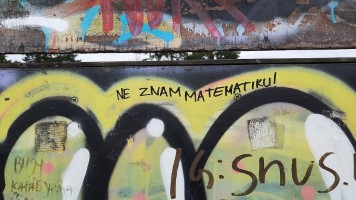
Ministru prosvete je, imam utisak, sve teže da ostane ozbiljan. A jedino može još to – da glumi ozbiljnost. Računa se ovako: ako je ozbiljan, onda valjda zna šta radi. Ne zna. I samo što ne pukne od smeha zbog stvari koje izgovara. Do juče je bilo, ako je dvoje ili 10 odsto dece u razredu zaraženo, taj razred prelazi na nastavu online. Na suvislu primedbu da je u našim razredima dvoje uglavnom daleko od 10 odsto dece, ministar je ostao nem. Na stranu sad što je teško praktično tačno ustanoviti koliko je 10 odsto u odeljenjima od 25 do 30 i nešto učenika. Da li će se precizno ustanovljenih 10 odsto zaokruživati na gornji ili donji celi broj u postotku? Ministar nem.
More...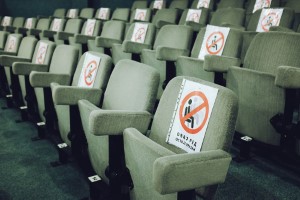
Roditelji u Valjevu protestuju dve večeri zaredom. Kažu da njihova deca nemaju iste uslove školovanja kao deca u Beogradu i Novom Sadu i smatraju da je to nedopustivo. Srednje škole u ovoj opštini započele su novu školsku godinu u takozvanom žutom ili kombinovanom modelu. Nepune dve nedelje kasnije, ministarstvo ih je prebacilo u crveni model. To znači da od ovog ponedeljka svi srednjoškolci u Valjevu nastavu slušaju online.
More...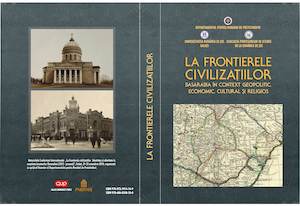
Instituţiile vechi de învăţământ fac parte dintre depozitarele patrimoniului cultural şi ştiinţific al unei societăţi. Valorificând sursele inedite ale Arhivelor Naționale a Republicii Moldova, surse ce ţin de trecutul şi evoluţia unor instituţii de învățământ cu cele mai vechi tradiţii din spaţiul dintre Prut şi Nistru, suntem în măsură să afirmăm că istoria școlii este o oglindă a societății, ea conservând mentalitatea și cultura unei epoci uitate.
More...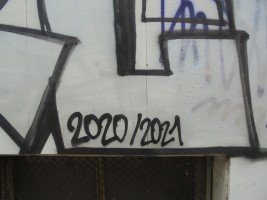
Već mesecima nameravam da napišem ovaj tekst. Odustajala sam jer nemam pozadinu u pedagogiji i ne znam dovoljno o obrazovnom sistemu i institucionalnim aranžmanima koji omogućavaju funkcionisanje škola. Odustajala sam jer mislim da je školarcima teško, ali da ni nastavnicima nije lakše, ma koliko da su požrtvovani i koliko god da vešto barataju tehnikom dok za male pare iskaču iz virtuelnih u stvarne učionice i nazad. Odustajala sam, najzad, zato što sam se potajno nadala da će božanstva u ministarstvu zaduženom za prosvetu dekretom ukinuti prijemni ispit za srednje škole ove kužne godine, ili da će roditelji dece koja završavaju osmi razred izvršiti neki tehno-ustanak, iz svojih virtuelnih stanovaučionica, uz poštovanje svih pandemijskih mera. Ali, evo prolazi april, i ništa, ni ustanka ni dobre države.
More...
Neće se zatvarati škole, kaže notorni Kon. I dodaje: nastava je organizovana po grupama i ako se dvoje iz grupe razboli, „ta se grupa isključuje i prelazi na on line nastavu“. Čitaocu je sigurno zapao za oko termin „isključuje“. Notorni Kon nije rekao da ta deca ostaju kod kuće ili samo da „prelaze na on line nastavu“. On kaže – ta se deca „isključuju“. To je ne samo netačan nego i krajnje neprimeren termin za ono što je notorni Kon u stvari hteo da kaže. Mislim, netačan i neprimeren ako se na stvari gleda iz jednog prosvetnog i pedagoškog ugla. Ali, notorni Kon je vojnik, biće hijerarhije, kazni i isključivanja, za njega deca nisu đaci nego pitomci, a bolest nije stanje, nego je prekršaj za koji sledi kazna isključenja. Da je tražio, a verovatno jeste, Vučić ne bi našao podesnijeg poslušnika (lutku na koncu ili povocu, svejedno) od notornog Kona za zloupotrebu zaraze.
More...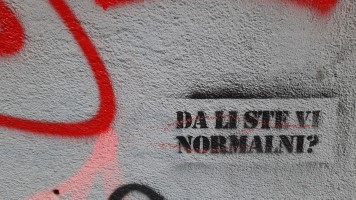
Jedna majka je već prvog dana poslužila Šarčeviću i družini kao žrtveno jagnje. Šarčević izričito kaže, dobro je što se to dogodilo baš prvog dana škole, pa sad strogim kažnjavanjem majke ostale možemo da naučimo pameti. A šta se zapravo dogodilo? Majka, kako piše u vesti, radi u takozvanoj kovid bolnici. Iz nekog razloga – nijedna vest ne kaže koji je to razlog, niti je neko za to pitao majku – testirala je dan pre škole dete na virus korone. Sledeći dan dete je otišlo u školu. U toku dana stigao je i pozitivan rezultat testa. Majka je odmah obavestila učiteljicu i dete je sklonjeno iz razreda. Onda su iz škole sklonjeni i razred i učiteljica. Tu, naravno, nije kraj priče. Majka je sad izložena linču. Šarčević podnosi prijavu protiv nje. Za šta tačno?
More...
Evo kako to izgleda u Berlinu. Deca su krenula u školu. Posle par dana neka od njih su se razbolela, dobila visoku temperaturu. Bolesna, ostala su kod kuće, ali roditelji nisu znali da li da ih vode kod lekara ili ne. Sledeći dan, temperatura je pala. I naredni dan, opet, nije je bilo, pa su se roditelji pitali da li da dete šalju nazad u školu. Pozvali su lekara da pitaju šta da rade. Posle mnogo pokušaja, lekar se javio i pitao da li dete kašlje. Kašlje, rekli su roditelji. Onda ne treba da ide u školu, rekao je lekar. Dovedite ga ispred doma zdravlja, pa ćemo mu tu na ulici, a ne u zgradi, uzeti bris i videti šta je.
More...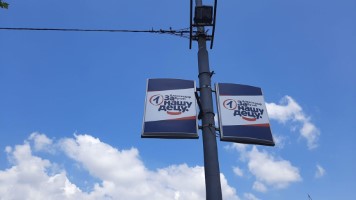
Neko bi to sada već morao otvoreno da kaže: nema dobrog rešenja za novu školsku godinu pod pretnjom zaraze. O obrazovnom septembru moralo se misliti još u martu. Više smo puta o tome ovde govorili: u martu je jedini cilj bio da se dočeka jun, a od septembra, bez zaraze, verovalo se, sve će se vratiti na staro. Zaraza je ostala, a sve „staro“ se raspalo pod njenim pritiskom.
More...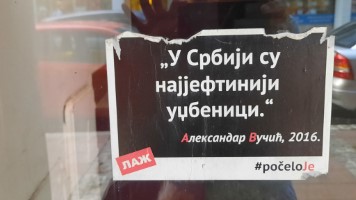
Čekali smo utorak i Šarčevića. Danima se najavljivalo iz vlade, kriznog štaba te ministarstva prosvete posebno da će se u utorak izaći sa definitivnim rešenjem za pohađanje škole pod pretnjom zaraze. Dočekali smo onda taj famozni utorak, ali ne i rešenje. U utorak je Šarčević samo ponovio sve što je govorio i pre utorka, dakle – ništa. Da bi već u sredu to ništa dodatno poništio rekavši da će odlazak u školu od 1. septembra zavisiti od tekućih prilika. Ko se nadao da će mu ove nedelje konačno biti jasno kako će se deca obrazovati najesen, prevario se. Tako to inače biva kada odluke treba da donesu prevaranti.
More...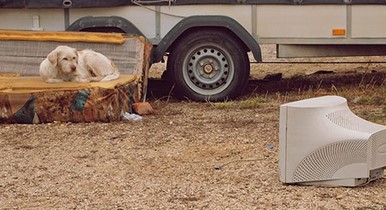
U subotu su škole širom Srbije imale da nadoknade izgubljeni nastavni ponedeljak. Čitalac zna: u prošlu nedelju uveče proglašeno je vanredno stanje. U ponedeljak đaci su ostali kod kuće, a u škole je stigao hitan dopis o „ostvarivanju obrazovno-vaspitnog rada učenjem na daljinu za učenike osnovnih i srednjih škola“. Smisao dopisa dat je u jednoj strogoj uvodnoj napomeni: „privremeno obustavljanje neposredne nastave u školama ne znači i obustavljanje obrazovno-vaspitnog rada sa učenicima“.
More...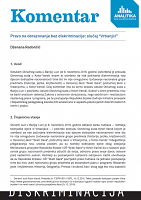
Odlukom Okružnog suda u Banjoj Luci od 9. novembra 2016. godine, potvrđena je presuda Osnovnog suda u Kotor-Varoši kojom je utvrđeno da nije počinjena diskriminacija nad djecom bošnjačke nacionalnosti time što im nije omogućeno izučavanje nacionalne grupe predmeta (historije, jezika, književnosti) u Osnovnoj školi “Sveti Sava”, područnoj školi u Vrbanjcima, u Kotor-Varoši. Ovaj komentar ima za svrhu analizu odluke Okružnog suda u Banjoj Luci i, posredno, odluke Osnovnog suda u Kotor-Varoši. Sudovi u ovom predmetu nisu se bavili analizom rješenja Zakona o osnovnom obrazovanju, nego sadržinom i realizacijom nastavnog plana i programa, pa će postupanje Republike Srpske (tačnije ministra prosvjete i Republičkog pedagoškog zavoda) biti analizirano iz aspekta potencijalnih diskriminatornih normi i praksi.
More...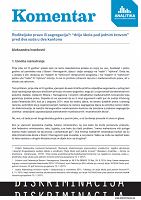
Prije više od tri godine pisala sam na temu skandalozne prakse po kojoj se, evo, dvadeset i jednu godinu od završetka rata u Bosni i Hercegovini, djeca i dalje odvajaju na “naše” i “njihove”. Onda se, u skladu s tim, obrazuju po “našem” ili “njihovom” obrazovnom programu. I na “našem” ili “njihovom” jeziku uče “našu” ili “njihovu” istoriju. A sve to protivno zdravom razumu i međunarodnom pravu, ali u skladu sa zakonom.
More...
Fascism is an evil with many faces. Its manifestation forms can be recognized even in societies of developed democracy, and in societies that have emerged or are emerging from the authoritarian and totalitarian forms of the rule, Fascism still has many manifestations. The actuality of the fight against Fascism coincides with the effects of the global economic crisis, which is just one of the favourable ambient for Fascism ‘to get a chance’. Digestible and shallow in its expression, Fascism relatively easily mobilizes social dissatisfaction by offering simple, malefic solutions. Fascism must be studied in a continuity, because from its appearance until today, Fascism survives by adapting its evil to the base passions of society. Therefore, it must be taught in schools, with an approach that will contribute to understanding the depth of this pestilence. Fascism is not only a great evil past, Fascism is a smouldering and constant danger. Also, attention should be paid to those who make a fetish from the anti-fascist struggle. Instead of affirmation of the civic concept of society and anti-fascist values, political demagogy is thus being introduced. And demagogy is also the fuel of Fascism. This warns how much this leviathan is a tough opponent, this rider of evil precisely through the demographic matrix presents itself as a knight of salvation. Fascism has countless roles that it can play in a society of non-resistance to economic crises, national-chauvinist tendencies, and bad public policies. In order to strengthen the society and make it more resistant to the evil of Fascism, it is necessary to work on building the capacities of a civil and democratic society through the affirmation of the principles of coexistence, tolerance, social responsibility and solidarity. The best and most noble method of strengthening society on a sound basis is the clear concept of antifascist education and the creation of opportunities for the citizen to become stronger and more resilient to fascist tendencies and demagogic campaigns. Education through learning the facts, tolerance and critical thinking with the encouragement of dialogue – is the concept that must find a place in our schools.
More...
Centre for Civic Education (CCE), within its sub-programme Transitional justice, aims to contribute to the effective process of facing with the past through series of different, yet interconnected, activities. In this respect, the CCE team, within its study “Montenegrin textbooks: what do they conceal and reveal about the contemporary history of Montenegro?”, analysed the content of material which is nowadays available in formal education system, including primary, secondary and higher education level, whereby higher education was analysed through the sample of three faculty units of the University of Montenegro. Furthermore, a research was conducted with the objective to assess the impact of some of the effects of such education approach on the (lack of) knowledge of students. Finally, an assessment of the existing model of history teaching, with accompanying recommendations to modernise and harmonise it with the needs of a society, which tends to develop into a democratic, is also provided. Focus of this study, among other issues, was on the manner in which the causes, course and outcome of war events which marked the history of region, thereby of Montenegro as well, are presented in the Montenegrin education system. Unfortunately, Montenegrin textbooks are practically “cleansed” of all potentially “dangerous” content, which restricts the potential of society to comprehend and evaluate that period based on facts, which further encumbers the already arduous process of facing the past. History teaching should develop critical thought and spirit of tolerance, prevent or challenge the existing prejudice and promote openness towards diversity. However, judging by what Montenegrin students can learn through the formal education system, we are far from that. Namely, Montenegrin students cannot learn in schools either on the extent or the manner in which Montenegro participated in war events, nor which war crimes were perpetrated during the nineties in region and in Montenegro, nor how many victims were on the behalf of Montenegro, from Montenegro and in Montenegro. Montenegrin educational institutions still demonstrate insufficient will that is necessary to resist the politicisation of textbooks, either in what they conceal or reveal, which questions the educational role of history as a subject, at least when it comes to contemporary history of Montenegro. Moreover, it is concerning that this approach is present on every level of education – from primary to higher, which already yields the teaching staff which does not have this part of history in his/her memory, nor has had the chance to learn about it adequately, but already enters classroom to teach it. “Remembrance” occurs under the influence of many factors, out of which one of the most influential is the history teaching in schools, and especially history textbooks. They promote a certain value system, legitimise and determine political and social order. Therefore, it could be said that education obtained in schools is the result of complex relations of power and fight of groups determined by class, gender and religious belief. Precisely because of that, textbooks play a paramount role and serve as important levers of power in every part of the world.1 Hence, it is necessary to change the existing textbooks and update them, while persons in charge of this task should have the integrity to refuse making compromises with authorities on the manner in which Montenegrin contemporary history should be presented, history already marked by those who are still high on the political ladder of Montenegro.
More...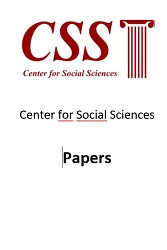
The current study aims to identify the educational needs of the Koni Municipality population. For this purpose, qualitative research, namely focus group discussions were conducted in the region. Total of 6 focus groups were conducted in the town of Koni and village of Nakhakhulevi. Respondents were divided into focus groups according to their age and place of residence, rural or urban settlements within Khoni municipality. The research showed that poverty and unemployment are one of the most pressing economic issues in the municipality. Majority of the currently employed individuals in the municipality work in agricultural, retail trade and furniture production sectors. Due to lack of educational centers in the municipality and limited financial resources, the majority of the local population does not have access to post-secondary formal or informal education. Namely, among most demanded skills and knowledge were foreign language proficiency, computer literacy and craftsmanship. Thus, these are the spheres the population would be willing to have training courses locally.
More...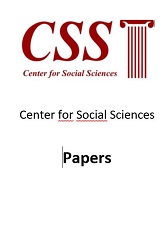
The present research conducted by the Center for Social Sciences (CSS) touches upon the ties between education and employment in Georgia and covers three main dimensions: individual return of education (financial benefits), compatibility of education with the labour market, and job satisfaction. Data analysis presented in this paper is based on the nationwide representative quantitative survey carried out by CSS in summer 2016 as a part International Social Survey Program (2015 Work Orientation IV Survey); we also used the World Bank 2013 statistical database. The data was analysed using the SPSS statistical program. The publication consists of three interconnected chapters. The structure consecutively follows the abovementioned topics that are actively studied by the economics of education in the contemporary world. Since our main objective was to show the real picture of the relations between education and employment in Georgia, we believe that the research findings will largely contribute to the better understanding and development of the state education policy. Each chapter consists of three parts: context, i.e. literature review; overview of the main findings, i.e. in-depth analysis of the obtained data; and summary discussion containing all the major conclusions and findings of the research. At the end of the publication, certain recommendations are provided for the state agencies and educational institutions. The publication ends with annexes containing tables and diagrams and the respective bibliography.
More...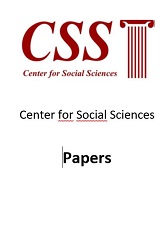
The rapid change of education system reform vector in Georgia increased the General Education centralization process. During the last two years the changes were passed in the law on General education. The changes reinforced the role of Ministry of Education and Science was in the school management process. The Minister issued decrees, Teachers Professional Code of Ethics, Students Code of Ethics, Standard of School Principle were adopted and enforced in 2010. Based on the new regulations Georgian Public Schools developed and renewed Public School Bylaws. // The School Bylaws reflected the changes entered in force. The General Education system management changed and as a whole it contributed strengthening the zero tolerance tendencies. The school discipline management procedures are strengthened. The School Bylaws determined the inflexible punishable measures connected with the discipline abolishment, though the exact description of the discipline abolishment in the prepared Bylaws is not noticed. The Bylaws define the school management style and control mechanisms. In this article the Georgian Public Schools’ Bylaws are studied and identified the needs of systematic changes of Education Policy, in particular, discipline management.
More...